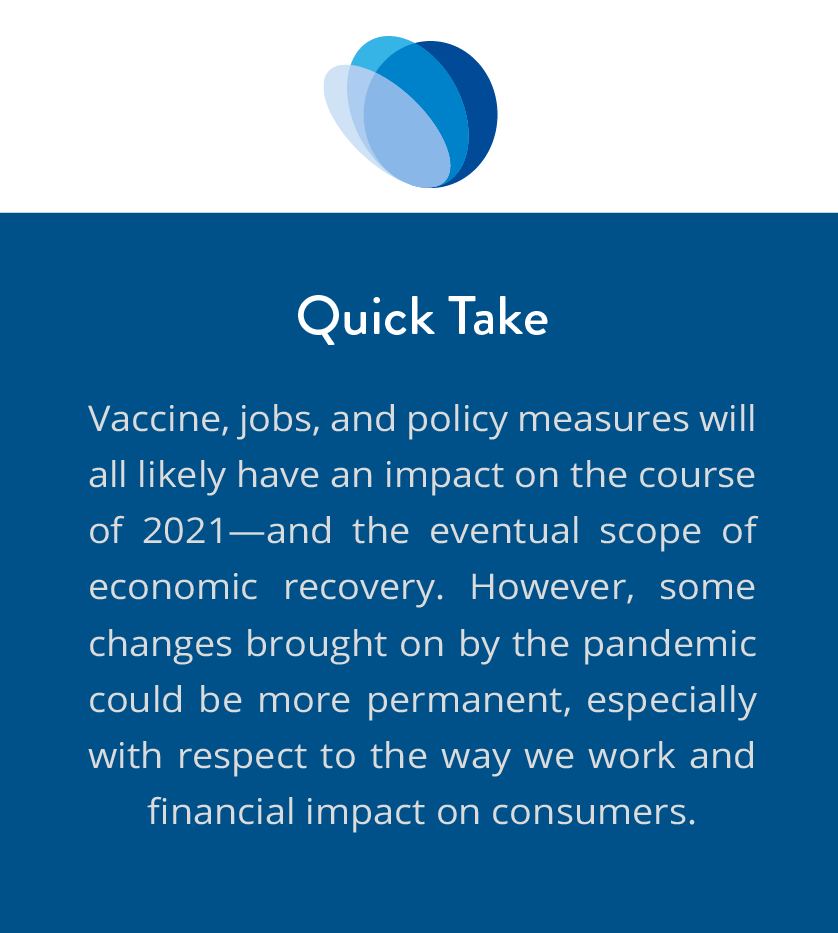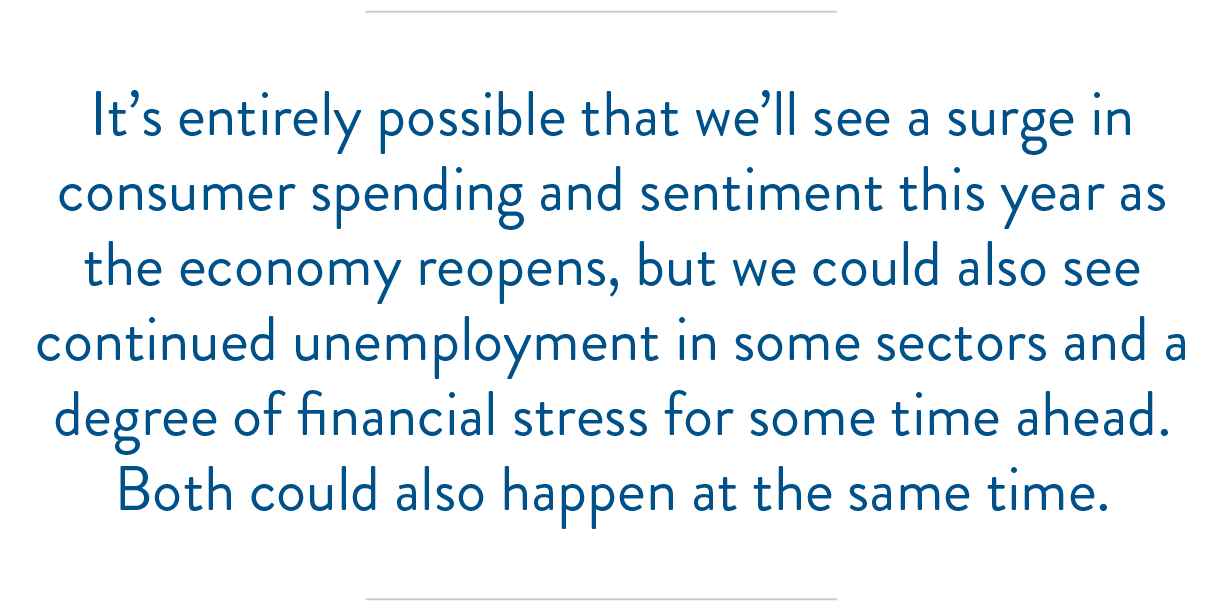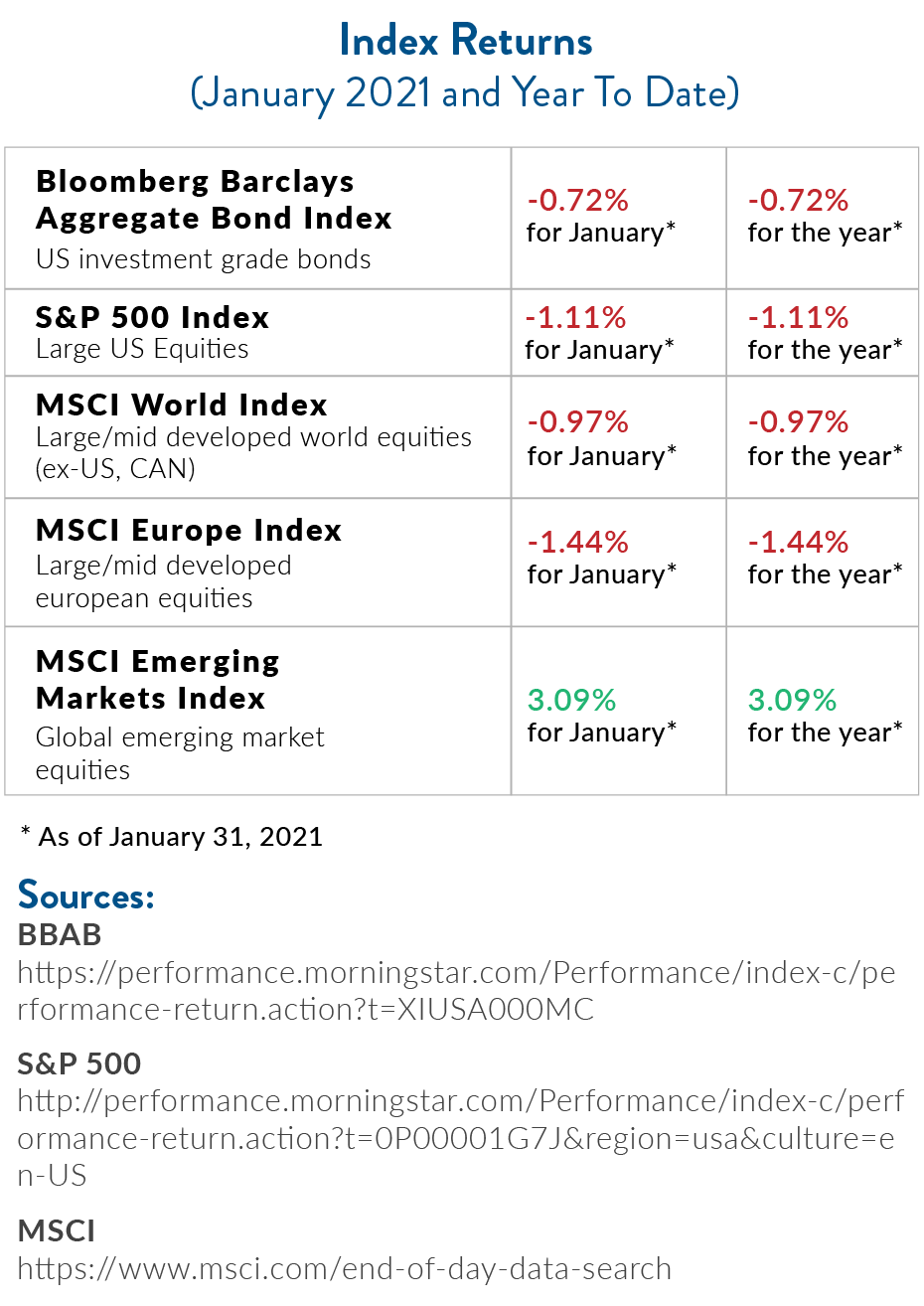Vaccination Rollouts and the Economy
The last week of January brought volatility to equity markets to close out the month, delivering their worst performing week since October. GameStop, which we’ve talked about previously, presented an interesting source of news and confusion for investors, while concerns about the vaccine rollout and economic data somewhat tempered sentiment.
That said, we’ve passed an important milestone with respect to vaccination rollout: More people have now been vaccinated in the U.S. than have tested positive for the disease.[1] What does this mean for getting back to normal—and how fast can we expect that to happen?
Vaccine Impact
The current vaccine rollout is a crucial first step toward fully opening the U.S. economy. Nearly 1.4 million vaccinations are being administered per day, and almost 10% of the U.S. population has received at least one dose.[2] Currently, the Biden Administration has plans to purchase enough doses to fully vaccinate 300 million Americans through the summer (note that vaccines are not yet approved for those under age 16).[3]
A different story is unfolding in other parts of the world. At current vaccination rates, worldwide herd immunity (achieved when roughly 75% of a population is vaccinated) won’t be a reality for about seven years.[4] Vaccine refusal is also high in some places such as France, where a recent poll found that fewer than half of respondents were willing to be vaccinated.[5]
That said, broad vaccination rates could provide businesses and consumers with a path toward normalcy—at least in theory.

Jobs and Employment
While the unemployment rate fell to 6.3% in January, this was partly driven by people leaving the labor force entirely—not a great trend.[6] Additionally, almost 40% of unemployed Americans have been out of work for over 6 months;[7] overall, almost 10 million jobs have been lost to the pandemic.[8]
The hope is that employment starts to come back with wider vaccination, but it might just be a starting point. Americans owe about $200 billion in unpaid financial obligations, ranging from rents to personal loans. While borrowers have enjoyed short-term help thanks to both to policy measures and lenders, this also creates a potential hurdle to a rapid return to normalcy—at least for those most affected.[9]
There is also the potential for a broad change in the nature of work. Fourth quarter gross domestic product (GDP), a measure of economic output, jumped—partly due to a leap in productivity. Is this a sign that the complexion of work (and, perhaps, demand for workers) is changing? It’s currently unclear, but we think it’s likely that the pandemic has shifted the norms and needs of workers and businesses in various ways. This could also have an impact on hiring practices and wages going forward—though, again, much remains to be seen.
Policy Support
Both the vaccine rollout and jobs situation will, of course, continue to be influenced by policy.
The Biden Administration’s American Rescue Plan (ARP), which we reviewed in a recent white paper, is currently with Congress. The ARP seeks to provide additional fiscal support for vaccine distribution, local and state governments, businesses, and individuals to successfully move past the upcoming stretch of the pandemic.
As of this writing, the first of two budget resolutions has been approved, opening the door for budget reconciliation. This, in turn, means that the ARP will require a simple majority vote to pass.[10]
Finding Normalcy
So, what does all this mean for getting our country back to normal? We consider the afore-mentioned issues because of their wide-ranging influence—and the difficulty of making predictions about them.
 For example, it’s entirely possible that we’ll see a surge in consumer spending and sentiment this year as the economy reopens, but we could also see continued unemployment in some sectors and a degree of financial stress for some time ahead. We think it’s entirely possible that these two things could, in fact, happen at the same time.
For example, it’s entirely possible that we’ll see a surge in consumer spending and sentiment this year as the economy reopens, but we could also see continued unemployment in some sectors and a degree of financial stress for some time ahead. We think it’s entirely possible that these two things could, in fact, happen at the same time.
As we all know, if a different strain of the virus proves to be resistant to vaccines, our economic outlook will quickly change.
For now, it’s looking like we’ll experience a jump in economic growth this year while also contending with remaining uncertainties of the pandemic and its impact on consumers and businesses. To that end, we continue to advocate for the same prudence, patience, and planning that we always recommend. While the market, economy, and state of the world can change, we believe that a methodical approach is always best. If you need to raise cash, it is always best to sell from a position of strength, so please schedule a call with us so that we can review your projected goals and needs for 2021.
If you have any questions about these issues, please don’t hesitate to reach out. We’re here to help and offer guidance in any way we can.
Download print version of this article
Securities are offered through Mid Atlantic Capital Corporation (“MACC”) a registered broker dealer, Member FINRA/SIPC.
Investment advice is offered through JSF Financial, LLC, which is not a subsidiary or control affiliate of MACC.
Confidentiality Note: This email communication including all attachments transmitted with it may contain confidential information intended solely for the use of the addressee. If the reader or recipient of this communication is not the intended recipient, or you believe that you have received this communication in error, please notify the sender immediately by return email or by telephone at (323) 866-0833 and PROMPTLY delete this email including all attachments without reading them or saving them in any manner. The unauthorized use, dissemination, distribution, or reproduction of this email, including attachments, is strictly prohibited and may be unlawful.
The information expressed herein are those of JSF Financial, LLC, it does not necessarily reflect the views of Mid Atlantic Capital Corporation (MACC). Neither JSF Financial LLC nor MACC gives tax or legal advice. All opinions are subject to change without notice. Neither the information provided, nor any opinion expressed constitutes a solicitation or recommendation for the purchase or sale of any security. Investing involves risk, including possible loss of principal. Indexes are unmanaged and cannot be invested in directly.
Historical data shown represents past performance and does not guarantee comparable future results. The information and statistical data contained herein were obtained from sources believed to be reliable but in no way are guaranteed by JSF Financial, LLC or MACC as to accuracy or completeness. The information provided is not intended to be a complete analysis of every material fact respecting any strategy. The examples presented do not take into consideration commissions, tax implications, or other transactions costs, which may significantly affect the economic consequences of a given strategy. Diversification does not ensure a profit or guarantee against loss. Carefully consider the investment objectives, risks, charges and expenses of the trades referenced in this material before investing.
Asset Allocation and Diversification do not guarantee a profit or protect against a loss.
The Bloomberg Barclays U.S. Aggregate Bond Index measures the investment-grade U.S. dollar-denominated, fixed-rate taxable bond market and includes Treasury securities, government-related and corporate securities, mortgage-backed securities, asset-backed securities and commercial mortgage-backed securities.
The S&P 500 Index is an unmanaged, market value-weighted index of 500 stocks generally representative of the broad stock market.
The MSCI World Index is a broad global equity index that represents large and mid-cap equity performance across 23 developed markets countries and covers approximately 85% of the free float-adjusted market capitalization in each country.
The MSCI Europe Index captures large and mid cap representation across 15 Developed Markets countries in Europe and covers approximately 85% of the free float-adjusted market capitalization across the European Developed Markets equity universe.
The MSCI Emerging Markets Index captures large and mid-cap representation across 26 emerging markets countries and covers approximately 85% of the free float-adjusted market capitalization in each country.
Gross domestic product (GDP) is a monetary measure of the market value of all the final goods and services produced in a specific time period. GDP is the most commonly used measure of economic activity.
Sources:
By clicking on these links, you will leave our server, as they are located on another server. We have not independently verified the information available through this link. The link is provided to you as a matter of interest. Please click on the links below to leave and proceed to the selected site.
[1] https://www.bloomberg.com/graphics/covid-vaccine-tracker-global-distribution/
[2] https://www.wsj.com/livecoverage/covid-2021-02-08?mod=djemCapitalJournalDaybreak
[3] https://www.wsj.com/articles/biden-administration-officials-told-governors-they-will-increase-weekly-vaccine-allocations-to-states-11611693766?mod=article_inline
[4] https://www.bloomberg.com/news/articles/2021-02-04/when-will-covid-pandemic-end-near-me-vaccine-coverage-calculator
[5] https://www.wsj.com/articles/as-vaccines-raise-hope-cold-reality-dawns-covid-19-is-likely-here-to-stay-11612693803?mod=djemCapitalJournalDaybreak
[6] https://www.cnbc.com/2021/02/05/jobs-report-january-2021.html
[7] https://www.nytimes.com/2021/02/05/business/economy/january-2021-jobs-report.html
[8] https://www.moodys.com/researchdocumentcontentpage.aspx?docid=PBC_1264521
[9] https://www.moodys.com/researchdocumentcontentpage.aspx?docid=PBC_1264521
[10] https://www.cnbc.com/2021/02/05/senate-passes-budget-resolution-toward-1point9-trillion-covid-relief-bill.html
Performance table sources:
BBAB: https://performance.


